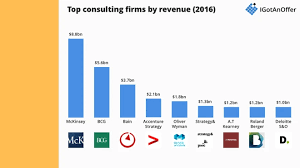Title: Top Brand Strategy Consulting Firms: Unlocking Success for Businesses
Introduction:
In today’s fiercely competitive business landscape, creating a strong brand identity is crucial for success. Brand strategy consulting firms play a pivotal role in helping businesses navigate the complex world of branding, enabling them to stand out from the crowd and connect with their target audience effectively. In this article, we will explore some of the top brand strategy consulting firms that have consistently delivered exceptional results for their clients.
McKinsey & Company:
Renowned for its expertise in various business domains, McKinsey & Company has established itself as a leader in brand strategy consulting. Their team of seasoned consultants possesses extensive knowledge and experience in developing comprehensive brand strategies that align with clients’ business objectives. With a data-driven approach and a focus on innovation, McKinsey & Company helps businesses build strong brands that resonate with consumers.
The Boston Consulting Group (BCG):
BCG is another prominent player in the field of brand strategy consulting. Their consultants are known for their analytical prowess and ability to craft tailored strategies that drive growth and market differentiation. BCG’s holistic approach combines market research, consumer insights, and competitive analysis to develop compelling brand narratives that captivate audiences across various platforms.
Interbrand:
Interbrand is globally recognized for its expertise in brand valuation, strategy, and design. They work closely with clients to identify their unique value proposition and create meaningful connections with their target customers. Interbrand’s deep understanding of consumer behavior and market trends enables them to craft strategic initiatives that elevate brands to new heights.
Landor:
With a rich heritage spanning over 75 years, Landor has established itself as a trusted partner for brand strategy consulting. Their multidisciplinary team brings together experts from diverse backgrounds such as design, psychology, and marketing to create impactful branding solutions. Landor’s collaborative approach ensures that every aspect of a client’s brand is strategically aligned, from visual identity to brand positioning.
Prophet:
Prophet is renowned for its ability to unlock growth opportunities through brand strategy. They combine consumer insights, market research, and creative thinking to develop strategies that drive business transformation. Prophet’s team of strategists and designers work closely with clients to create compelling brand experiences that resonate with customers and foster long-term loyalty.
Conclusion:
In an increasingly competitive marketplace, having a well-defined brand strategy is vital for businesses looking to thrive. The top brand strategy consulting firms mentioned in this article have consistently delivered exceptional results by helping businesses create strong brands that connect with their target audience. Whether it’s McKinsey & Company’s data-driven approach or Landor’s expertise in design, these firms bring invaluable insights and expertise to the table. By partnering with one of these top brand strategy consulting firms, businesses can unlock their full potential and achieve sustainable growth in today’s dynamic business environment.
Unleashing the Power of Top Brand Strategy Consulting Firms: 9 Proven Advantages
- Expertise and Experience
- Tailored Solutions
- Market Insights
- Innovation
- Strategic Planning
- Brand Positioning
- Competitive Advantage
- Increased Customer Engagement
- Measurable Results
Drawbacks of Top Brand Strategy Consulting Firms: A Comprehensive Analysis
- High Cost
- Limited Availability
- Lack of Personalization
- Potential Overreliance on External Expertise
- Communication Challenges
- Implementation Gap
Expertise and Experience
Expertise and Experience: The Powerhouses of Brand Strategy Consulting
In the ever-evolving world of business, developing a strong brand strategy is essential for success. This is where top brand strategy consulting firms truly shine. With their wealth of expertise and experience, these firms possess the knowledge and insights needed to craft effective brand strategies that resonate with target audiences.
One of the key advantages of partnering with a top brand strategy consulting firm is their team of consultants who bring a deep understanding of market trends, consumer behavior, and industry best practices. These professionals have spent years honing their skills, working with diverse clients across various sectors. Their extensive experience allows them to navigate the complexities of branding with ease, providing valuable guidance throughout the strategic process.
The consultants at these firms are well-versed in current market dynamics and possess a keen eye for emerging trends. They stay up-to-date with the latest industry developments, ensuring that their clients receive the most relevant and effective strategies. By leveraging their expertise, businesses can gain a competitive edge in an increasingly crowded marketplace.
Moreover, these consultants have a comprehensive understanding of consumer behavior and preferences. They conduct thorough research and analysis to uncover insights that shape brand strategies tailored to specific target audiences. This knowledge enables them to create compelling narratives that resonate deeply with consumers, fostering strong emotional connections between brands and their customers.
Another significant benefit lies in the industry networks that top brand strategy consulting firms have cultivated over time. Their extensive connections allow them to tap into valuable resources such as market research data, industry benchmarks, and case studies from successful branding initiatives. This access to a vast pool of knowledge further enhances their ability to develop robust brand strategies that deliver results.
Ultimately, it is the combination of expertise and experience that sets top brand strategy consulting firms apart. Their consultants possess a unique blend of analytical thinking, creative problem-solving skills, and strategic vision. By drawing upon this wealth of knowledge, businesses can confidently navigate the intricacies of branding, knowing that they are guided by professionals who have successfully tackled similar challenges in the past.
In conclusion, the expertise and experience offered by top brand strategy consulting firms are invaluable assets for businesses seeking to establish a strong brand presence. Their consultants’ in-depth knowledge, industry insights, and understanding of consumer behavior empower businesses to develop effective strategies that resonate with their target audiences. By partnering with these powerhouses of brand strategy consulting, companies can unlock their full potential and achieve long-term success in today’s competitive marketplace.
Tailored Solutions
Tailored Solutions: The Key Advantage of Top Brand Strategy Consulting Firms
In the world of business, one size does not fit all. Every company has its own distinct challenges, objectives, and vision. Recognizing this, top brand strategy consulting firms offer a significant advantage by providing tailored solutions that are specifically designed to meet the individual needs of each client.
These firms understand that a cookie-cutter approach to brand strategy simply won’t cut it. Instead, they take the time to thoroughly understand their clients’ businesses, target audience, competition, and long-term goals. This deep understanding allows them to develop custom strategies that align perfectly with their clients’ unique circumstances.
By offering tailored solutions, these consulting firms ensure that the brand strategy they create is a perfect fit for their clients’ vision and goals. They work closely with their clients throughout the process, taking into account their specific requirements and preferences. This collaborative approach ensures that the final brand strategy reflects the essence of the business and resonates with its target audience.
Tailored solutions also mean that these consulting firms can address specific challenges faced by businesses in different industries. Whether it’s navigating regulatory complexities in healthcare or staying ahead of rapidly evolving technology trends in the digital space, top brand strategy consultants have the expertise to adapt their strategies accordingly.
Moreover, these tailored solutions take into consideration market dynamics and consumer insights. By conducting thorough research and analysis, these firms can identify unique opportunities for growth and differentiation within each client’s industry. This allows them to develop strategies that not only address current challenges but also position businesses for long-term success.
The benefits of tailored solutions extend beyond immediate results; they also foster strong partnerships between consulting firms and their clients. By understanding and addressing specific needs, consulting firms demonstrate their commitment to helping businesses achieve their goals. This level of personalized attention builds trust and ensures ongoing collaboration as businesses evolve over time.
In conclusion, one of the key advantages offered by top brand strategy consulting firms is their ability to provide tailored solutions. By understanding the unique challenges and objectives of each client, these firms develop strategies that align perfectly with their clients’ vision and goals. This personalized approach not only delivers effective brand strategies but also fosters long-term partnerships based on trust and collaboration. For businesses looking to make a lasting impact in the market, partnering with a top brand strategy consulting firm can be a game-changer.
Market Insights
Market Insights: The Key Advantage of Top Brand Strategy Consulting Firms
In the fast-paced and ever-evolving business world, staying ahead of the competition requires a deep understanding of the market landscape. This is where top brand strategy consulting firms truly shine. One of the key advantages they bring to businesses is their ability to conduct thorough market research and provide invaluable market insights.
Brand strategy consulting firms recognize the importance of gaining deep insights into consumer preferences, competitor analysis, and emerging trends. They employ various research methodologies to gather data and uncover critical information that can shape a company’s brand positioning and messaging.
By conducting comprehensive market research, these firms help businesses make informed decisions about their brand strategy. Here’s why market insights are such a valuable asset:
Understanding Consumer Preferences:
Consumer preferences are constantly evolving, influenced by factors such as changing demographics, societal trends, and technological advancements. Brand strategy consulting firms delve into consumer behaviour patterns, conducting surveys, focus groups, and data analysis to identify key drivers that influence purchasing decisions. Armed with this knowledge, businesses can tailor their brand messaging to resonate with their target audience effectively.
Competitor Analysis:
In a competitive marketplace, understanding your competitors is essential for success. Brand strategy consulting firms conduct thorough competitor analysis to identify strengths, weaknesses, opportunities, and threats within the industry. This information enables businesses to position themselves strategically in relation to their competitors. By identifying gaps in the market or areas where they can differentiate themselves from rivals, companies can craft unique value propositions that set them apart.
Identifying Emerging Trends:
Staying ahead of emerging trends is crucial for maintaining relevance in a rapidly changing business environment. Brand strategy consulting firms keep a close eye on industry trends through continuous monitoring and analysis. They identify emerging technologies, shifts in consumer behaviour, or new market segments that may impact a company’s brand strategy. By being proactive in adapting to these trends, businesses can seize opportunities before their competitors do.
Making Informed Decisions:
Ultimately, market insights provided by brand strategy consulting firms empower businesses to make informed decisions about their brand positioning and messaging. Armed with data-driven insights, companies can develop strategies that align with consumer preferences, capitalize on market opportunities, and effectively differentiate themselves from competitors.
In conclusion, the ability of top brand strategy consulting firms to conduct thorough market research and provide valuable market insights is a significant advantage for businesses. By understanding consumer preferences, conducting competitor analysis, and identifying emerging trends, these firms equip companies with the knowledge needed to make informed decisions about their brand strategy. With this valuable information at hand, businesses can position themselves strategically in the marketplace and achieve long-term success.
Innovation
Innovation: The Driving Force Behind Top Brand Strategy Consulting Firms
In today’s rapidly changing business landscape, staying ahead of the curve is crucial for success. Top brand strategy consulting firms understand this dynamic environment and continuously innovate to deliver exceptional results for their clients. One of the key advantages they bring to the table is their ability to infuse innovation into every aspect of brand strategy.
These consulting firms have a finger on the pulse of market trends, consumer behavior, and emerging technologies. They leverage this knowledge to develop fresh perspectives and creative ideas that help businesses differentiate themselves from competitors and seize new opportunities.
By embracing innovation, these firms challenge conventional thinking and push boundaries. They encourage their clients to explore uncharted territories, experiment with new approaches, and disrupt traditional norms. This mindset allows businesses to break free from stagnant routines and discover innovative ways to connect with their target audience.
Top brand strategy consulting firms foster a culture of creativity within their teams. They attract talented professionals who possess diverse skill sets and encourage collaboration across various disciplines. By bringing together experts in design, marketing, psychology, data analysis, and more, these firms create a melting pot of ideas that nurtures innovation.
With access to cutting-edge tools and technologies, these consulting firms can uncover valuable insights that drive strategic decision-making. They employ advanced analytics to identify emerging trends, consumer preferences, and untapped market segments. By harnessing the power of data-driven insights, they help businesses make informed choices that align with their brand vision.
Moreover, top brand strategy consulting firms are adept at identifying gaps in the market where businesses can carve out a unique position for themselves. Through thorough research and analysis, they uncover untapped customer needs or underserved niches that present opportunities for growth. By capitalizing on these insights, businesses can develop innovative solutions that address unmet demands.
Innovation is not just about introducing novel ideas; it’s also about adapting to change quickly. Top brand strategy consulting firms have a keen eye for emerging trends and shifts in consumer behavior. They help businesses stay agile and responsive by proactively adjusting their strategies to meet evolving market demands.
In conclusion, innovation is a fundamental pro of top brand strategy consulting firms. Their ability to bring fresh perspectives, creative ideas, and cutting-edge technologies to the table enables businesses to differentiate themselves from competitors and capture new opportunities. By embracing innovation as a driving force, these firms empower businesses to navigate the ever-evolving business landscape with confidence and achieve sustainable growth.
Strategic Planning
Strategic Planning: The Key to Building Strong Brands with Top Brand Strategy Consulting Firms
One of the key advantages of partnering with top brand strategy consulting firms is their expertise in strategic planning. These firms excel at developing comprehensive roadmaps that pave the way for building strong, impactful brands. By outlining clear objectives, defining key performance indicators (KPIs), and establishing actionable steps, they provide businesses with a solid foundation for long-term success.
Strategic planning is crucial because it sets the direction and tone for a brand’s growth and development. Without a well-defined strategy, businesses may find themselves lost in a sea of competitors, struggling to differentiate themselves or connect with their target audience effectively. This is where top brand strategy consulting firms step in to guide and support businesses on their branding journey.
These firms understand the importance of aligning brand strategy with overall business objectives. Through careful analysis and research, they identify the unique value proposition that sets a business apart from its competitors. They work closely with clients to gain insights into their industry landscape, target market, and customer preferences. Armed with this knowledge, they develop tailored strategies that resonate with the intended audience.
A key aspect of strategic planning is setting clear objectives and KPIs. Top brand strategy consulting firms help businesses define what success looks like for their brand and establish measurable goals to track progress along the way. This ensures that efforts are focused on achieving tangible outcomes rather than relying on vague aspirations.
Furthermore, these firms break down the strategic plan into actionable steps. They provide businesses with a roadmap that outlines specific tasks, timelines, and responsibilities necessary for implementing the brand strategy effectively. This level of detail allows companies to execute their plans efficiently while staying on track towards achieving long-term success.
By leveraging their expertise in strategic planning, top brand strategy consulting firms empower businesses to make informed decisions based on data-driven insights. They help companies navigate through complex market dynamics and identify opportunities for growth and expansion. This strategic guidance ensures that businesses stay ahead of the curve, adapt to changing consumer preferences, and remain competitive in their respective industries.
In conclusion, top brand strategy consulting firms excel in strategic planning by developing comprehensive roadmaps for building strong brands. Their ability to outline clear objectives, define KPIs, and establish actionable steps sets the stage for long-term success. By partnering with these firms, businesses gain access to invaluable expertise and insights that drive their branding efforts forward. With a solid strategic plan in place, companies can confidently navigate the ever-evolving business landscape and build brands that truly resonate with their target audience.
Brand Positioning
Brand Positioning: Unlocking Success through Strategic Consulting
In the ever-evolving marketplace, brand positioning plays a vital role in determining the success of a business. It is the art of defining how a company wants to be perceived by its target audience and differentiating itself from competitors. Top brand strategy consulting firms excel in assisting businesses with this crucial aspect of brand strategy.
Identifying Unique Selling Points:
One of the key contributions of brand strategy consulting firms is their expertise in identifying a business’s unique selling points (USPs). Through in-depth market research and analysis, these firms help uncover what sets a company apart from its competitors. By understanding the strengths, weaknesses, opportunities, and threats faced by the business, consultants can pinpoint its distinctive attributes that resonate with customers.
Defining Value Propositions:
Once the unique selling points are identified, brand strategy consultants work closely with businesses to define their value propositions. This involves crafting a clear and compelling message that communicates the unique benefits a company offers to its target audience. By articulating these value propositions effectively, consulting firms help businesses establish a strong position in consumers’ minds.
Crafting Compelling Narratives:
Brand strategy consulting firms excel at crafting compelling narratives that align with businesses’ objectives and resonate with their target customers. They understand that storytelling is a powerful tool for creating emotional connections and building brand loyalty. By developing authentic and engaging narratives, consultants help businesses connect with their audience on a deeper level.
The expertise provided by these consulting firms is invaluable as they bring extensive knowledge and experience to the table. Their deep understanding of consumer behavior, market trends, and competitive landscapes allows them to create effective strategies for brand positioning.
With an effective brand positioning strategy in place, businesses can benefit in numerous ways. They can attract their ideal customers by clearly communicating their unique value propositions. Additionally, well-positioned brands are more likely to command higher prices for their products or services as customers perceive them as offering greater value.
In conclusion, brand positioning is a crucial aspect of brand strategy that consulting firms excel in. By identifying unique selling points, defining value propositions, and crafting compelling narratives, these firms help businesses create a strong and differentiated brand presence. With their expertise and strategic guidance, businesses can effectively communicate their value to their target audience and achieve long-term success in the competitive marketplace.
Competitive Advantage
Article:
Competitive Advantage: How Top Brand Strategy Consulting Firms Drive Business Success
In today’s fast-paced and highly competitive business landscape, gaining a competitive edge is essential for long-term success. This is where top brand strategy consulting firms come into play, offering businesses the expertise and guidance needed to stand out from the competition. One significant advantage of working with these firms is their ability to help businesses identify gaps in the market, capitalize on emerging trends, and differentiate themselves through innovative branding initiatives.
One of the key strengths of top brand strategy consulting firms lies in their deep understanding of market dynamics. Through thorough research and analysis, they can identify untapped opportunities that exist within a particular industry or target market. By leveraging this knowledge, businesses can position themselves strategically to fill these gaps and gain a competitive advantage.
Moreover, top brand strategy consulting firms have their finger on the pulse of emerging trends. They possess valuable insights into evolving consumer preferences, technological advancements, and industry shifts. By staying ahead of the curve, these firms can guide businesses in adapting their brand strategies to align with changing market dynamics. This proactive approach allows companies to stay relevant and capture new opportunities before competitors do.
Differentiation plays a vital role in creating a strong brand presence. Top brand strategy consulting firms excel at helping businesses develop unique value propositions that set them apart from competitors. They work closely with clients to understand their target audience and craft compelling narratives that resonate with consumers on an emotional level. By differentiating themselves through innovative branding initiatives, businesses can attract attention, build loyalty, and ultimately gain a competitive advantage.
Furthermore, these consulting firms bring fresh perspectives and outside expertise to the table. They have worked with various clients across different industries and have amassed a wealth of knowledge about what works and what doesn’t in terms of branding strategies. This breadth of experience allows them to offer unique insights tailored specifically to each business’s needs. By tapping into this expertise, companies can make informed decisions and avoid common pitfalls, giving them an edge over competitors who may lack such specialized knowledge.
In conclusion, working with top brand strategy consulting firms provides businesses with a competitive advantage in several ways. From identifying market gaps to capitalizing on emerging trends and creating differentiation through innovative branding initiatives, these firms offer valuable guidance that can propel businesses towards success. By leveraging their expertise, companies can position themselves strategically, attract customers, and stay ahead of the competition in today’s ever-evolving business landscape.
Increased Customer Engagement
Increased Customer Engagement: The Power of Effective Branding
In an era where customers are bombarded with countless options, standing out from the competition is no easy feat. This is where top brand strategy consulting firms come into play, offering businesses a valuable advantage by creating emotional connections with customers and driving engagement.
One of the key benefits of working with these consulting firms is their expertise in enhancing customer engagement through effective branding strategies. By employing proven techniques, they help businesses create consistent messaging that resonates with their target audience. This messaging goes beyond mere advertising; it tells a story and evokes emotions that forge a deep connection between the brand and its customers.
Visual identity development plays a crucial role in this process. Consulting firms understand the power of visual elements such as logos, colours, and design aesthetics in capturing attention and conveying brand values. By crafting a visually appealing and cohesive brand identity, these firms ensure that every touchpoint – from websites to packaging to social media profiles – reflects the essence of the brand, leaving a lasting impression on customers.
Moreover, storytelling techniques are employed to engage customers on a deeper level. Through compelling narratives that align with the brand’s values and purpose, consulting firms help businesses connect with their audience on an emotional level. By tapping into human emotions such as joy, nostalgia, or inspiration, brands can create memorable experiences that resonate long after the initial interaction.
The result? Increased customer loyalty and advocacy. When customers feel emotionally connected to a brand, they are more likely to remain loyal over time. They become passionate advocates who willingly share their positive experiences with others. This word-of-mouth marketing becomes invaluable in attracting new customers and building a strong reputation in the market.
Ultimately, increased customer engagement leads to tangible business outcomes. It drives higher customer retention rates and repeat purchases while also attracting new customers through positive recommendations. Businesses that invest in effective branding strategies offered by top brand strategy consulting firms position themselves for long-term success in an increasingly competitive marketplace.
In conclusion, the expertise of top brand strategy consulting firms in enhancing customer engagement is a significant advantage for businesses. Through consistent messaging, visual identity development, and storytelling techniques, these firms help brands forge emotional connections with their customers. By creating memorable experiences and fostering loyalty, businesses can thrive in today’s fast-paced and ever-evolving business landscape.
Measurable Results
Measurable Results: Unlocking Success with Top Brand Strategy Consulting Firms
In today’s fast-paced business world, companies are constantly seeking ways to measure the effectiveness of their brand strategies. This is where top brand strategy consulting firms truly shine. One significant advantage they offer is the ability to deliver measurable results.
Consulting firms understand the importance of setting clear goals and objectives for brand strategies. They work closely with businesses to define specific metrics that will be used to evaluate success. These metrics could include customer engagement, market share growth, brand awareness, or even financial indicators such as revenue and profitability.
By establishing these measurable goals upfront, consulting firms provide businesses with a framework for tracking progress and evaluating the impact of their brand strategies. This data-driven approach allows companies to make informed decisions based on concrete evidence rather than relying solely on intuition or guesswork.
The beauty of measurable results is that they provide a tangible way to gauge the effectiveness of brand strategies over time. Businesses can see how their efforts are translating into real-world outcomes and identify areas for improvement or adjustment if necessary. This iterative process enables companies to continuously refine their strategies for optimal performance.
Moreover, having access to quantifiable data allows businesses to make strategic decisions based on facts rather than assumptions. It empowers them to allocate resources effectively, invest in areas that generate the highest returns, and pivot when needed. By leveraging these insights, companies can make smarter decisions that drive sustainable growth and enhance their competitive edge.
Another benefit of measurable results is the ability to showcase success internally within an organization. Clear metrics and tangible outcomes provide a compelling story that can be shared with stakeholders, including executives, employees, investors, and even customers. Demonstrating progress through data helps build confidence in the effectiveness of brand strategies and fosters a culture of accountability and continuous improvement.
In conclusion, one of the key advantages offered by top brand strategy consulting firms is their focus on delivering measurable results. By setting clear goals and establishing metrics to evaluate success, these firms enable businesses to track their progress, make data-driven decisions, and continuously improve their brand strategies. This emphasis on measurable outcomes provides companies with the confidence and insights needed to navigate the competitive landscape successfully.
High Cost
Title: The Con of Top Brand Strategy Consulting Firms: High Cost
Introduction:
While top brand strategy consulting firms offer invaluable expertise and guidance, there is a notable downside that businesses must consider before engaging their services. One significant drawback is the high cost associated with partnering with these renowned firms. This article will explore the con of high costs and how it can pose challenges, particularly for small or budget-constrained businesses.
High Cost:
Engaging top brand strategy consulting firms can come with a hefty price tag. These firms have built a reputation for their expertise, experience, and proven track record in delivering successful brand strategies. As a result, they often command premium fees for their services. While these fees may be justifiable for larger corporations or companies with substantial budgets, they can present a considerable obstacle for small businesses or those operating on tight financial constraints.
For small businesses aiming to establish or enhance their brand presence, the cost of hiring top brand strategy consulting firms may simply be beyond their means. Allocating a significant portion of their budget to consultancy fees could strain other essential areas of business operations such as marketing campaigns, product development, or hiring key personnel.
Moreover, the duration of engagement with these firms can also impact costs. Developing an effective brand strategy often requires time and ongoing collaboration between the consulting firm and the client. This extended period of consultancy can further escalate expenses and become financially burdensome for smaller enterprises.
Alternative Solutions:
Recognizing the financial limitations faced by many businesses, alternative solutions exist to address branding needs without breaking the bank. While they may not offer the same level of expertise as top brand strategy consulting firms, these alternatives can still provide valuable insights and guidance at a more affordable cost.
One option is to seek out smaller boutique agencies or independent consultants who specialize in brand strategy. These professionals often possess considerable expertise and experience but may charge lower fees compared to larger consulting firms due to their size or market positioning.
Another alternative is to invest in internal resources and talent development. By nurturing a team with a strong understanding of branding principles, businesses can gradually build their brand strategy capabilities in-house. This approach requires time and investment in training and development but can prove cost-effective in the long run.
Conclusion:
While top brand strategy consulting firms offer unparalleled expertise, it is essential to consider the potential drawbacks, such as the high cost associated with their services. For small or budget-constrained businesses, the financial burden of engaging these firms may outweigh the benefits they provide. Exploring alternative solutions, such as boutique agencies or internal resource development, can help mitigate these challenges and still enable businesses to develop effective brand strategies within their financial means. Ultimately, finding the right balance between cost and expertise is crucial for any business seeking to enhance its brand presence while remaining financially sustainable.
Limited Availability
Title: Con of Top Brand Strategy Consulting Firms: Limited Availability
Introduction:
While top brand strategy consulting firms offer valuable expertise and guidance, it’s important to consider potential drawbacks before engaging their services. One significant con that businesses may encounter is the limited availability of these firms. The high demand for their services often means that securing their assistance can be challenging, requiring advanced booking or waiting for an opening in their schedule. This inconvenience can pose a hurdle for businesses seeking immediate assistance.
Limited Availability Challenges:
Advanced Booking: Due to the popularity and reputation of top brand strategy consulting firms, they often have a full schedule well in advance. Businesses looking to engage their services may need to book consultations or projects several weeks or even months ahead. This can be problematic for companies facing urgent branding challenges or those seeking timely strategic advice.
Waiting Lists: In some cases, businesses may find themselves on waiting lists as these firms juggle multiple ongoing projects. This delay can prolong the time it takes to access their expertise and insights, potentially impacting business growth and competitiveness.
Time-sensitive Projects: When businesses require immediate assistance with time-sensitive projects such as product launches or crisis management, limited availability can hinder progress. Delays in securing the services of top brand strategy consulting firms might impede the timely execution of critical strategies, leaving businesses at a disadvantage.
Mitigating Strategies:
Plan Ahead: To mitigate the impact of limited availability, businesses should anticipate their future branding needs and plan accordingly. By identifying potential challenges in advance, they can secure the services of top consulting firms well ahead of time.
Explore Alternatives: While top brand strategy consulting firms are highly sought after, there are other reputable consultants available who may provide excellent guidance and support. Exploring alternatives within the industry can help businesses find suitable expertise when faced with limited availability issues.
Maintain Relationships: Building relationships with multiple consulting firms over time allows businesses to have a broader network of resources to tap into. By establishing connections with various consultants, companies can increase their chances of finding available support when needed.
Conclusion:
While top brand strategy consulting firms offer exceptional expertise and guidance, limited availability can pose challenges for businesses seeking immediate assistance. Advanced booking requirements and waiting lists may delay access to their services, potentially impacting time-sensitive projects. However, by planning ahead, exploring alternative options, and maintaining relationships with multiple consultants, businesses can navigate around this con and still benefit from valuable branding insights.
Lack of Personalization
Title: The Conundrum of Top Brand Strategy Consulting Firms: Lack of Personalization
Introduction:
In the realm of brand strategy consulting, top firms are often revered for their expertise and ability to drive success. However, one notable drawback that businesses may encounter when working with these firms is the lack of personalization in their standardized approaches. While their vast knowledge and experience are undeniably valuable, it is essential to consider how well their strategies align with the unique needs and nuances of individual businesses.
The Pitfall of Standardized Approaches:
Top brand strategy consulting firms often rely on tried-and-tested methodologies that have yielded positive results for numerous clients. While this approach can be effective in many cases, it may not always address the specific challenges or opportunities faced by each business. The cookie-cutter nature of these standardized approaches can hinder the development of a truly tailored strategy.
The Importance of Individuality:
Every business has its own distinctive characteristics, target audience, competitive landscape, and long-term goals. A lack of personalization in brand strategy consulting can result in strategies that fail to fully capture these unique elements. This could potentially lead to missed opportunities or ineffective brand positioning.
The Need for Customized Solutions:
To overcome this conundrum, it is crucial for businesses to seek a balance between leveraging the expertise of top brand strategy consulting firms and ensuring that their strategies are customized to match their specific circumstances. This requires open communication and collaboration between both parties.
Collaboration as a Solution:
By fostering a collaborative partnership with a brand strategy consulting firm, businesses can actively participate in shaping the strategies being developed. This ensures that their insights and perspectives are taken into account, leading to more personalized solutions that align with their business objectives.
Seeking Boutique Consultancies:
Another alternative worth exploring is working with boutique brand strategy consultancies that specialize in offering highly personalized services. These smaller firms often prioritize individual attention and tailor-made strategies based on an intimate understanding of their clients’ businesses. This can result in a closer alignment between the brand strategy and the unique needs of the business.
Conclusion:
While top brand strategy consulting firms undoubtedly possess extensive knowledge and experience, their standardized approaches may lack the personalization required to address the unique challenges faced by individual businesses. It is crucial for businesses to actively engage in the strategy development process, fostering collaboration and seeking alternatives such as boutique consultancies that prioritize customization. By striking this balance, companies can ensure that their brand strategies are finely tuned to their specific needs, ultimately driving greater success in an increasingly competitive marketplace.
Potential Overreliance on External Expertise
Title: Potential Pitfall of Top Brand Strategy Consulting Firms: Overreliance on External Expertise
Introduction:
While top brand strategy consulting firms offer valuable insights and expertise, it’s important to acknowledge that there can be potential downsides to relying too heavily on external consultants. One such drawback is the risk of overreliance, which can hinder internal learning and growth within an organization. In this article, we will explore the con of potential overreliance on external expertise and its impact on businesses.
The Drawback:
One of the primary concerns with relying solely on brand strategy consulting firms is the possibility of creating a dependency on their expertise. While these firms bring valuable insights and industry knowledge to the table, businesses may inadvertently limit their own capacity for learning and growth by not nurturing in-house capabilities.
Limited Internal Development:
By continuously outsourcing brand strategy initiatives, businesses may miss out on opportunities to develop their own internal talent pool. Building in-house expertise allows organizations to have a deep understanding of their unique brand challenges and industry dynamics. It also empowers them to adapt quickly to changing market conditions without solely relying on external consultants.
Lack of Ownership:
Overreliance on external consultants can lead to a lack of ownership over the brand strategy process within an organization. When businesses rely too heavily on these firms, they may become disconnected from critical decision-making processes related to branding. This lack of ownership can hinder creative thinking, innovation, and long-term brand sustainability.
Cost Considerations:
Another factor worth considering is the financial aspect. Relying heavily on external consultants can be costly for businesses in the long run. Continuous engagement with these firms may strain budgets and limit resources available for other crucial aspects of business development.
Balancing External Expertise with Internal Growth:
To mitigate the potential drawbacks associated with overreliance, businesses should strike a balance between leveraging external expertise and fostering internal growth. It’s essential for organizations to invest in their employees, providing them with training and opportunities to develop their own brand strategy capabilities. This approach ensures a more sustainable and self-reliant approach to branding.
Collaborative Partnerships:
Rather than relying solely on external consultants, businesses can consider fostering collaborative partnerships. This allows for knowledge sharing and a more integrated approach to brand strategy. By working closely with consultants and involving internal teams in the process, organizations can develop a deeper understanding of their brand and build internal expertise over time.
Conclusion:
While top brand strategy consulting firms offer valuable insights and expertise, businesses should be cautious about overreliance on external consultants. Developing internal capabilities is essential for long-term growth and sustainability. By striking a balance between leveraging external expertise and nurturing in-house talent, organizations can navigate branding challenges effectively while fostering internal learning and growth. It is through this collaborative approach that businesses can achieve a harmonious blend of external insights and internal ownership of their brand strategy.
Communication Challenges
Communication Challenges: A Con of Top Brand Strategy Consulting Firms
While top brand strategy consulting firms offer valuable expertise and guidance, it’s important to acknowledge that they are not immune to challenges. One common obstacle that arises is communication difficulties, which can hinder effective collaboration and timely decision-making processes between the firm and its clients.
Brand strategy consulting firms often work with multiple clients simultaneously, each with their unique requirements and timelines. This high demand for their services can sometimes lead to communication challenges and delays in response times. As consultants juggle various projects, it becomes increasingly important to manage client expectations and ensure clear lines of communication.
The potential for communication challenges arises when consultants are spread thin across different projects. Clients may find it difficult to reach their designated consultant promptly or receive timely updates on the progress of their brand strategy initiatives. This can lead to frustration and a perceived lack of attention or dedication from the consulting firm.
Furthermore, miscommunication or delays in communication can hinder effective collaboration between the consulting firm and its clients. Timely feedback, brainstorming sessions, and decision-making processes may be hampered if there are delays in responding to queries or providing necessary information. This can impact the overall efficiency of the brand strategy project.
To mitigate these challenges, both brand strategy consulting firms and their clients must prioritize open lines of communication from the outset. Clear expectations should be established regarding response times, regular check-ins, and channels of communication. Regular meetings or status updates should be scheduled to keep all stakeholders informed about project progress.
Additionally, leveraging technology solutions such as project management tools or collaborative platforms can help streamline communication processes between the consulting firm and its clients. These tools enable real-time updates, document sharing, and efficient collaboration even when consultants are working on multiple projects simultaneously.
Ultimately, while communication challenges may exist within top brand strategy consulting firms due to their workload demands, proactive measures can be taken by both parties involved to ensure effective communication throughout the engagement. By setting clear expectations, maintaining regular communication channels, and utilizing technology tools, these challenges can be minimized, allowing for smoother collaboration and successful brand strategy outcomes.
Implementation Gap
Article:
Implementation Gap: A Challenge for Top Brand Strategy Consulting Firms
When it comes to brand strategy, top consulting firms have earned their reputation for delivering exceptional strategic recommendations. Their expertise in market research, consumer insights, and competitive analysis allows them to craft comprehensive brand strategies that resonate with target audiences. However, there is a potential downside that businesses should be aware of – the implementation gap.
While these consulting firms excel at developing strategic plans, there can be challenges when it comes to effectively executing those plans within an organization. The success of a brand strategy relies heavily on seamless implementation, which often requires additional resources or internal alignment that these firms do not directly provide.
One of the reasons for this implementation gap is the inherent nature of consulting engagements. Consulting firms typically work with clients for a specific period, focusing on strategy development and providing recommendations. However, once the engagement ends, the responsibility for executing those recommendations falls back on the client’s internal teams.
This transition from strategy development to execution can be challenging. It may require significant effort and resources from the client’s side to align various departments, secure necessary budgets, and ensure ongoing commitment to the brand strategy. Without proper coordination and support internally, there is a risk that the strategic recommendations developed by consulting firms may not be fully realized or integrated into day-to-day operations.
Another factor contributing to the implementation gap is that consulting firms often lack detailed knowledge of a client’s internal dynamics and operational intricacies. While they bring valuable external perspectives and industry expertise, they may not have an in-depth understanding of specific organizational structures or cultural nuances that could impact successful execution.
To mitigate this challenge, businesses working with top brand strategy consulting firms should proactively address the implementation gap by considering several key steps:
- Internal Alignment: Engage key stakeholders within your organization early on in the strategy development process. This involvement will foster ownership and buy-in from internal teams who will ultimately be responsible for executing the brand strategy.
- Clear Communication: Ensure that the strategic recommendations are clearly communicated throughout the organization. This includes providing a detailed roadmap, explaining the rationale behind the strategy, and outlining the expected outcomes.
- Resource Allocation: Evaluate whether additional resources or expertise are required to effectively implement the brand strategy. Consider allocating dedicated teams or hiring external specialists to support the execution process.
- Ongoing Evaluation: Continuously monitor and evaluate the progress of implementation. Regularly assess whether adjustments or refinements are needed to align with evolving market dynamics or internal changes.
While there may be an implementation gap with top brand strategy consulting firms, it is essential to recognize that their expertise lies in developing effective strategies. By understanding this potential challenge and taking proactive steps to address it, businesses can bridge the gap and maximize the impact of their brand strategies.
In conclusion, while top brand strategy consulting firms offer valuable insights and recommendations, organizations must be mindful of the implementation gap that may arise during execution. By fostering internal alignment, clear communication, resource allocation, and ongoing evaluation, businesses can navigate this challenge effectively and ensure a seamless transition from strategy development to successful implementation.











